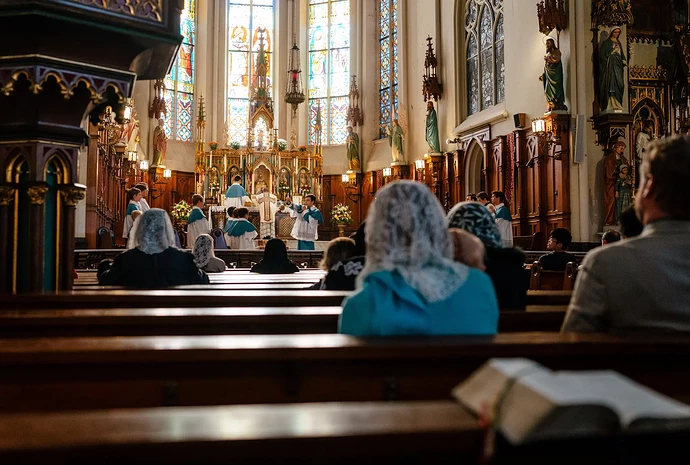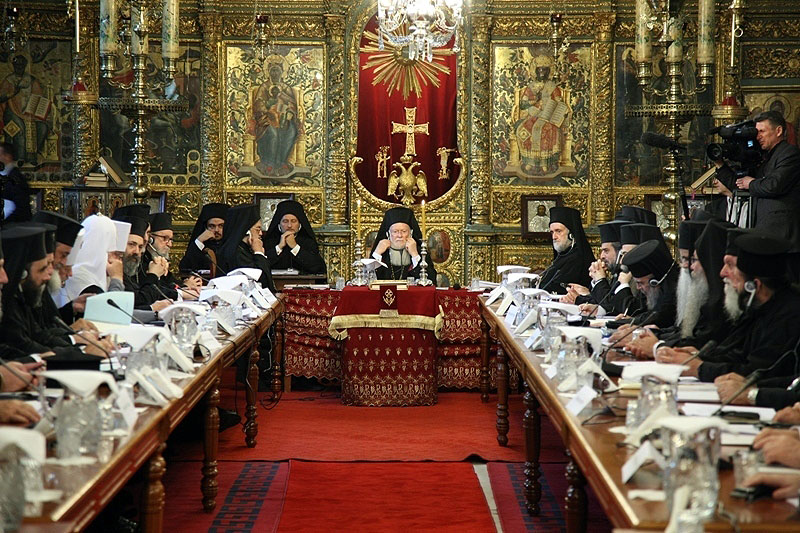I have been engaged in an internal dialogue, provoked by apologetic debates in catechism and discussions prevalent in Catholic forums across Hispanic America. This reflection is not merely personal but taps into a wider sentiment, focusing on our critical view of the Protestant Reformation and the late Enlightenment, while also incorporating the Eastern Orthodox critique of our own Roman Catholic views.
Often, people dismiss theology without realizing they are living out the secularized versions of theological errors made long ago. Dr. Farrell have pointed this out many times, our societies are structured around a dialectic of opposition—a Manichean worldview that is a profoundly flawed way of seeing things.
Saint Augustine’s theology inadvertently set the stage for this problem. However, Catholicism possesses a distinct framework that prevents the dualism and Manichean view from spiraling out of control. This has been a great and rich topic of debate during catechism. Catholics understands the world through a Catholic lens, not through the prism of modern ideologies. Consequently, the reasoning for addressing problems is drawn from Catholic tradition, not from the ideologies born of the Protestant Reformation and the Enlightenment.
Catholicism possesses a distinct sacramental and intellectual framework that prevents this binary view from spiraling into totalizing ideology. The Catholic worldview is not Manichean but incarnational. It does not see spirit as good and matter as evil; instead, it holds that grace perfects nature. This is why the physical world—the bread, wine, water, and oil of the sacraments—is understood as a vehicle for divine grace. This fundamental principle rejects the idea that the world must be divided into purely good and purely evil spheres.
Consequently, Roman Catholicism regards rigid secular ideologies—whether radical individualism, collectivism, or critical theory—as forms of idolatry. They are idolatrous because they take a single, partial aspect of truth (e.g., individual liberty, class struggle, identity) and absolutize it, making it the ultimate lens for all of reality. A Catholic is called to view the world through a Catholic lens, which is a comprehensive tradition of reason and faith, not through the narrow prism of modern ideologies born of the 16th-century Reformation and the 18th-century Enlightenment.
In my opinion, figures like Martin Luther and René Descartes unleashed a kind of Manichean Molotov cocktail. In both cases, personal conviction is elevated to define reality itself. This stands in stark contrast to the method of thinkers like Thomas Aquinas and the Church Fathers, who grounded their reasoning in an objective order.
From the Catholic perspective, Martin Luther’s fundamental failure was epistemological: he rejected the objective, synthesizing authority of the Church and its Tradition and replaced it with the subjective authority of the individual’s conscience and interpretation. This shift did not merely reform doctrine; it dismantled the very architecture of knowledge and authority that had, for centuries, provided a coherent and unified worldview.
The Catholic framework positioned Scripture, Sacred Tradition, and the Magisterium as a three-legged stool, a stable system where faith and reason could be harmonized, as exemplified by Aquinas’s synthesis of Christian revelation and Aristotelian philosophy. Luther’s principle of Sola Scriptura (Scripture alone), while intended to purify belief, effectively demolished two of those legs. By vesting final interpretive authority in the individual believer rather than in the Church, he made personal conviction the ultimate arbiter of truth. This inherently subjective turn planted the seed for the endless fragmentation of Christianity into competing denominations, as there was no longer a final authority and tradition to resolve disagreement. It was a theological parallel to Descartes’s philosophical “I think, therefore I am,” establishing the precedent that internal conviction could define reality itself.
This subjectivist turn was compounded by a rejection of the incarnational, sacramental worldview that prevents Manicheanism. Catholicism holds that grace perfects nature and is mediated through the physical world—the water of Baptism, the bread and wine of the Eucharist. Luther’s radical emphasis on Sola Fide (faith alone) inherently downplayed the necessity of these objective channels of grace, disenchanting the material world and making it a neutral backdrop to personal faith. This move away from a sacramental reality unintentionally paved the way for a secular materialism that sees the universe as mere matter, devoid of inherent meaning. Furthermore, his polemical characterization of the Papacy as the Antichrist launched a powerful “hermeneutic of suspicion” against all institutional authority. The logic of rejecting a corrupt 1,500-year-old institution did not stop at the Church’s door; it inevitably expanded to undermine kings, governments, and any established tradition. Thus, Luther’s rebellion, however justified in his eyes, set in motion the centrifugal forces of individualism and anti-institutionalism that would explode in the Enlightenment and define the modern age of ideological conflict, where personal truth relentlessly opposes personal truth.
This is not to claim the Catholic worldview is perfect. We all know the retarderies involved. It is to state unequivocally that it is far superior to the utter failure wrought by the Protestant Reformation.
Now, put yourself in the shoes of a Hispanic American with a traditional Catholic upbringing. A farmer in Peru. A Cattle rancher in Argentina. A coffee grower in San Juan. Why in the world are we, with a rich sacramental Christian heritage, adopting foreign ideologies conceived by a German monk? Why have we become hostages to the Manichean frameworks unleashed by the Protestant Reformation and the Enlightenment? These are the fundamental questions raging in the Hispanic world today. We already possess a foundational faith. We have the original formula—the “Coca-Cola Classic” of Western Christendom. It is a tradition of coherence, synthesis, and order. If we have the courage to shun the theological innovations of the German and everything that flowed from him, we will witness our problems begin to resolve themselves. The solution is not another imported ideology. The solution is returning to the foundation and recovering the one thing we have been missing: coherence.
An Eastern Orthodox response to the Hispanic Catholic views would express substantial agreement with its diagnosis of the modern problem but would offer a profound critique of its proposed Catholic solution, arguing that the Roman Church itself bears significant responsibility for the errors that led to the West’s theological and philosophical crisis. The Orthodox would wholly concur that modern society is trapped in a secularized pseudo-theology of opposition and that the Manichean tendency to divide reality into competing camps of pure good and pure evil represents a catastrophic failure of vision. They would further agree that the projects of Luther and Descartes represented a disastrous turn toward subjective individualism, elevating private conviction over shared truth. However, the Orthodox would fundamentally disagree that Roman Catholicism possesses a distinct framework that prevents this error, arguing instead that Catholicism’s own theological developments—many of which stem from Augustine’s thought—created the conditions for this modern fragmentation.
From an Orthodox perspective, the core issue lies in what they perceive as Catholicism’s rationalistic and legalistic reinterpretation of the faith, which began with the incorporation of Aristotelian philosophy into theology and accelerated with Augustine’s own intellectual legacy. While the Catholicism praises Augustine, Orthodoxy would see his theology of original guilt, his predestinarian tendencies, and his philosophical approach to divine essence and energies as themselves being foundational to the West’s problems. The Orthodox would argue that the true incarnational worldview—which does not simply affirm that “grace perfects nature” but proclaims that God became human so that humans might become god by grace—is most fully preserved in the Eastern tradition. They would contend that the Catholic sacramental system, while valid, became increasingly explained in legal and mechanistic terms rather than mystical and therapeutic ones, which inadvertently prepared the way for Descartes’s mechanistic worldview.
Most importantly, the Orthodox would challenge the claim that Catholicism alone offers a coherent alternative to secular ideologies. Instead, they would argue that the Great Schism of 1054 and the Reformation were not unrelated events but rather sequential manifestations of the same underlying deviation: the move toward centralized papal authority, the development of novel doctrines like the Filioque and purgatory, and the gradual replacement of experiential theology with scholastic rationalism. In this view, Protestantism was not simply a rebellion against a healthy Catholicism but rather the logical outcome of Catholicism’s own theological errors. Therefore, the solution is not a return to the pre-Reformation Roman framework but a recovery of the pre-Schism theological mind of the undivided Church—the consensus of the Church Fathers and the holistic experience of God through apophatic theology and hesychasm, which transcends the very dichotomy between reason and revelation that the West has struggled to reconcile. The true alternative to Manichean thinking, from an Orthodox perspective, is not a more perfect rational system but a participatory theology that transforms the human person through divine communion, restoring the broken unity between Creator and creation.
Many times during Catechism we have entered pre-schism territory. We share a profound love for the Apostolic Tradition and a common grief over the fractures in Christendom. There is much upon which we can agree, particularly the diagnosis of the modern world’s flight from truth into a subjective and oppositional mindset. We also deeply respect the Orthodox Church’s rich mystical and liturgical tradition, which has guarded a precious patrimony of the undivided Church.
Personally, I find the Eastern Orthodox perspective far more coherent than the Protestant. I should note that my understanding has been significantly shaped by the works of Dr. Farrell and my own study of catechism. Protestantism encompasses a vast spectrum of traditions, from high-church Anglicanism to low-church evangelicalism and Pentecostalism. Therefore, there is no single Protestant response that I can articulate.


